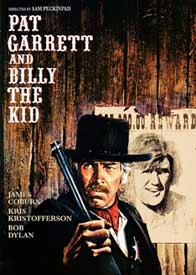 IIf the only great thing encountered in Pat Garrett & Billy the Kid (1973) had been Bob Dylan sitting on a fence rail, I'd be telling people to watch this one.
IIf the only great thing encountered in Pat Garrett & Billy the Kid (1973) had been Bob Dylan sitting on a fence rail, I'd be telling people to watch this one.
Dylan's theme song for the film "Knock Knock Knockin' At Heaven's Door" is one of his greatest, & the film deserved his best.
But what many never realized is Dylan also wrote much of the film's overall score, drawing so powerfully on his folk music heritage that it never seems merely at all a modern or a rock score, but feels, like the film itself, genuinely of another age.
This is a tragic straightforward cynical story that does not try for depth so much as it achieves depth just by letting good actors act out their characters' fates.
A relentless mood of sadness does not permit bloody shoot-outs to be mere fun, but neither does the film have some lame simpleminded message about how cruelty & violence is bad.
Like a good & gloomy severe samurai movie, the downbeat tone increases rather than decreases the degree of conviction & beauty as the film brings a viewer into what feels like it is authentically the west.
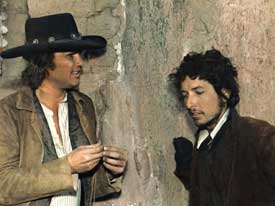 Of course cruelty & violence are bad, but it's also exciting in the context of fiction. And the sadness comes more from the inevitable demise of an era of wild deadly freedom. Of course cruelty & violence are bad, but it's also exciting in the context of fiction. And the sadness comes more from the inevitable demise of an era of wild deadly freedom.
Bad boys like Billy (Kris Kristofferson) can no longer be allowed to have their way in the world, but if such men are to be supplanted by lawmen as callous as Pat Garrett (James Coburn), it's not evolution, it's just change. The world of outlaw liberty is headed toward a world of civilized corruption.
If without ever having seen this film you try to imagine Kris Kristofferson of all people playing Billy the Kid you may roll your eyes, but he turns in what may be the one great performance of his acting career.
And as for James Coburn, his natural screen presence carried him through the majority of his roles, but Pekinpah gets more out of him than Coburn's usual walks-a-good-show, making Pat Garrett complicatedly dispicable & bold.
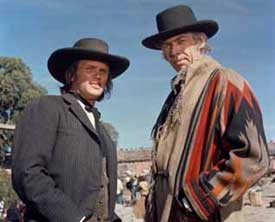 Pekinpah populates the corners of the film with great old-timey character actors like Chill Wills, Slim Pickens, & Jack Elam as Alamosa Bill, to much more daring casting that works including Dylan & Rita Coolidge (at the time married to Kristofferson). Pekinpah populates the corners of the film with great old-timey character actors like Chill Wills, Slim Pickens, & Jack Elam as Alamosa Bill, to much more daring casting that works including Dylan & Rita Coolidge (at the time married to Kristofferson).
Really this is one of Pekinpah's best, & I don't know why it's not usually put at the top of every list of best westerns.
The lack of reputation began with a bad edit of the film which Pekinpah had no part in, plus a lot of behind-the-scenes stuff made for good movie gossip in the day which overshadowed interest in the film, including Pekinpah's personal descent into alcoholism.
I first saw the film when it was brand new, at Midway Drive-in Theater near Seattle. The fact that it had a first-run in a drive-in was not in its favor.
As a yunker, I was mesmerized even by that originally ruined theatrical cut. But apart from other teenage & twenty-something fans of Dylan, it seemed like the film wasn't seen by anyone. Pekinpah's own director cut was unseen until 1988. On the basis of that belated version, the film's reputation has grown, but as far as I'm concerned, it hasn't grown enough.
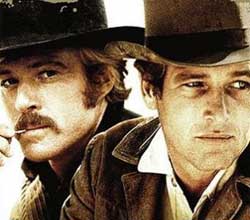 Butch Cassidy & the Sundance Kid (1969) much more romantically laments the end of the Wild West.
Butch Cassidy & the Sundance Kid (1969) much more romantically laments the end of the Wild West.
A bit too fashion-minded to be the visual equal of Pekinpah, with too much "fun" to the violence to be taken seriously, that catastrophic suicidal climax in Bolivia nevertheless provides a classic moment in western cinema because we'd come so much to care about the survival of Butch (Paul Newman) & Sundance (Robert Redford).
Both actors are in top form as entertaining actors & as buff beauties, though to be sure Newman is mugging as such a fashion plate that he's not as credible & good as in Cool Hand Luke (1967), while the modelish Gentleman's Quarterly perfection of Redford always detracts from the realism of his roles, a beauty he was never willing to subdue for sake of any role except Jeremiah Johnson (1972).
In its day their performances seemed to constitute just about the best western film ever had, but time has left some of it rooted in its decade of first release, much more about the '60s than the latter days of the wild west.
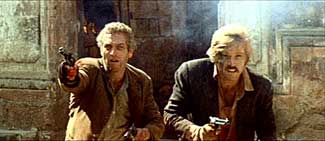 By contrast, another western contemporary to Redford & Newman's was Pekinpah's Wild Bunch (1969) was not afflicted with '60s fashion & never lost its visual sense of historicicity. By contrast, another western contemporary to Redford & Newman's was Pekinpah's Wild Bunch (1969) was not afflicted with '60s fashion & never lost its visual sense of historicicity.
Even the soundtrack made Butch & Sundance modern, not period. Instead of Dylan with his timeless composition "Knockin' on Heaven's Door" we've got what is at best a lounge lizard classic, Burt Bacharach's "Raindrops Keep Fallin' on My Head."
So young viewers might not always understand why Butch & Sundance are so beloved. Anyone of a certain age can be nostalgic for those days when this film was brand new, & still embrace it as an emblem of their own decade of youth & of a type of male bonding generally restricted to teenage boys, but almost never by grown straight men who secretly lament the same-sex platonic loves of innocent days of rebellion.
And if it no longer seems like the "real" west it has lost very little of its humor. And as the grandfather of high-octane action-buddy-flicks from Lethal Weapon (1987) onward, it remains better than nearly all of its grandchildren.
copyright © by Paghat the Ratgirl
|
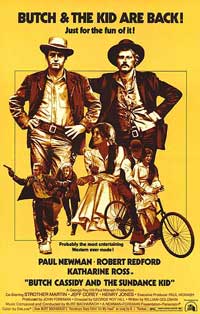

 Of course cruelty & violence are bad, but it's also exciting in the context of fiction. And the sadness comes more from the inevitable demise of an era of wild deadly freedom.
Of course cruelty & violence are bad, but it's also exciting in the context of fiction. And the sadness comes more from the inevitable demise of an era of wild deadly freedom. Pekinpah populates the corners of the film with great old-timey character actors like Chill Wills, Slim Pickens, & Jack Elam as Alamosa Bill, to much more daring casting that works including Dylan & Rita Coolidge (at the time married to Kristofferson).
Pekinpah populates the corners of the film with great old-timey character actors like Chill Wills, Slim Pickens, & Jack Elam as Alamosa Bill, to much more daring casting that works including Dylan & Rita Coolidge (at the time married to Kristofferson).
 By contrast, another western contemporary to Redford & Newman's was Pekinpah's Wild Bunch (1969) was not afflicted with '60s fashion & never lost its visual sense of historicicity.
By contrast, another western contemporary to Redford & Newman's was Pekinpah's Wild Bunch (1969) was not afflicted with '60s fashion & never lost its visual sense of historicicity.